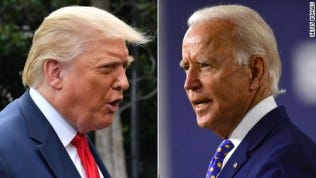If your presidential debate isn’t fit for kids, you’re not fit to be president
In a time when concerns about public health are stealing precious learning time from America’s children, it’s sad that this week’s presidential debate was another dispiriting lesson in failed leadership.
As citizens, we should expect the contest for the American presidency a top civics learning opportunity, but instead, we got schoolyard rock-throwing on Tuesday that wasn’t worthy of our children’s eyes, ears, or seat time.
That’s a shameful sign of three-plus errant years of declining decorum and lost integrity at the top of the American leadership pile – mostly because a lout has led us into moral anarchy.
If a president is the nation’s exemplar of our values and virtues, a presidential debate is a test, then Donald J. Trump spells trouble. The president I saw on Tuesday was a peevish and sweating example of everything I teach my kids not to be. He was rude, accusatory, irresponsible, blame-shifting, dishonest, and, worst of all, a nasty bully.
Let’s be honest here, if Trump were a Black 6th-grader behaving this way in a Houston classroom, he might be suspended and not allowed to return until his parents met with school staff about his self-regulation challenges.
Now, this is where I’m supposed to dazzle you with my broadmindedness by pointing out ways in which Biden fell short too.
Hard pass.
That form of mindless bothsiderism is a shortcut to thinking and judgment. It’s not good for a responsible citizen and fails as an appropriate example for children.
Unlike the president, I don’t see value in teaching our children to equate white supremacists with the convenient ghost of Antifa or the political cartoon of Black Lives Matter. To overstate something moral and obvious: There are no “very fine people” who are so spitting mad about the existence of non-whites that they descend on communities with tiki torches chanting “Jews will not replace us.”
If I fault Biden for anything, it’s not being assertive enough about centering these mass-media opportunities on the nation’s children. In my view, his education plan is expensively inconsequential concerning the things that matter most, but are talked about least: quality teaching, learning to standards, evidence-based educational interventions, and academic outcomes that close gaps between the haves and have-nots.
I waited for his promise to move hell and Earth, unions and bureaucrats, publics and privates, lefties and right-wingers, to ensure every American child gets a practical education that prepares her for life in the economic mainstream (a promise that every president since Lyndon Johnson has made), but instead, the former Vice President mostly shadow-boxed the patently erratic orangish gentleman to his right.
My friends, please expect more. When these two private school parents who want to lead the free world take the stage next time to present competing visions for where we should go as a people, let’s hold them to two demands.

First, they commit to being appropriate examples for our children of how great Americans behave, think, and debate. Or, let them disqualify themselves for failing on that point.
Second, they explicitly detail how their policies will prepare the next generation to be productive members of a free country. They must articulate a plan for systems and policies that allow children to learn in ways that best suit them.
We are so far from that now. Poor academic outcomes for racial minorities, students in poverty, and students with special needs are all too enduring. For example, in most states, less than a quarter of Black students read or perform math proficiently. Non-white students get the worst prepared teachers who – as research tells us – hold implicit biases against them. Further, students of color are more often identified for negative discipline consequences than for gifted programs (even when they don’t qualify for the former and do qualify for the latter).
At the same, education bureaucracies stifle the creativity of teachers through endless standardization. Their lobbying groups fight the emergence of innovative schools and programs that come from chartering laws. Their programs too often limit the most advanced students by gearing the system to a catch-all, mediocre middle.
On top of all that, legacy debts that were born of poor financial decisions compound over time and rob our students of their full per-pupil income by paying for yesterday’s obligations at the expense of tomorrow’s promise.
All the while, we lament the mythical cuts to education funding as the bill for public miseducation and its systemic failures escalates annually.
Hopefully, when they meet again, both candidates seeking our votes in the upcoming election will have something profound to say about how we change the game for students and families.
The candidates need to can speak to raising the expectations for results in education. We need to know how colleges can prepare better teachers for the classroom and how schools can better support them once they are there. Above all, we need to hear how these candidates can provide more resources directly to families so they can determine how, when, where, and what their children learn. We need a moonshot for things like getting all cities, towns, and rural areas wired with broadband and how we expand the educational opportunities diverse families need.
I’ll be watching the next presidential debate for all that and hoping against hope that two candidates worthy of the nation they want to lead show up with all their best faculties on display. Above all else, I hope they remember the children.
The post If your presidential debate isn’t fit for kids, you’re not fit to be president appeared first on citizen stewart.




